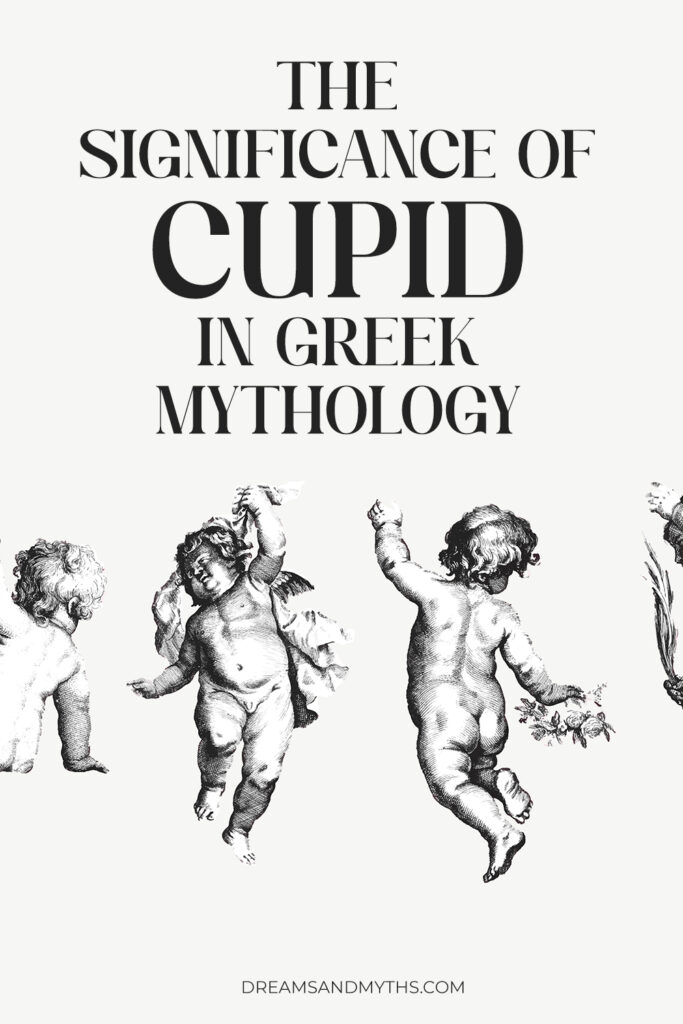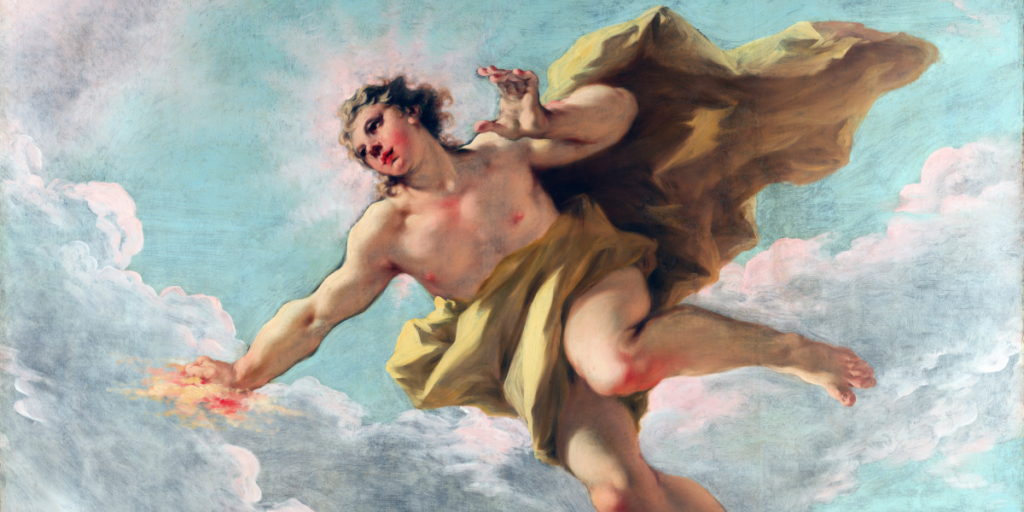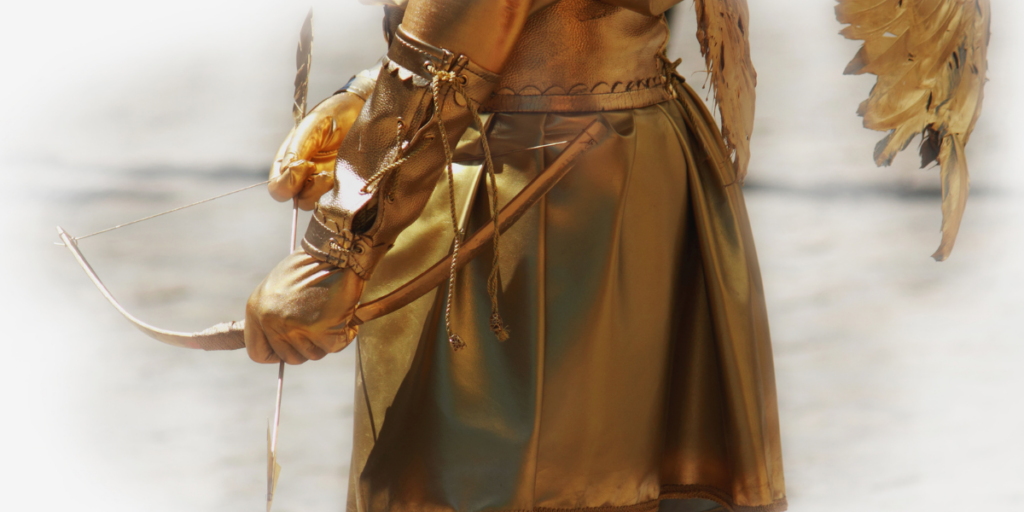Cupid is the winged-angel-like god in Roman mythology. In Roman mythology, Cupid was the son of Venus and Mercury.
He is synonymous with Eros in Greek mythology. Eros was the Greek god born to the supreme goddess of sexual desire and ultimate beauty, Aphrodite, and the Greek god of war named Ares.

The word “Erotica” is also derived from Eros or Cupid. Eros is represented as being a group of seven winged gods signifying sexual intercourse. It is believed that these winged gods were younger forms of Eros.
Erotes gained immense prominence in Hellenistic artworks along with its Roman counterpart, Cupid.
Appearance of Cupid
Cupid is shown as a naked winged child who fires arrows of love from his bows. And the person struck with Cupid’s arrows experiences a feeling of deep and passionate love. Cupid has been gifted with the ability to strike both mortals and immortals.
Another account states that Cupid is also seen sometimes wearing a suit of armor similar to that of the Roman god of war, Mars. This also represents the irony that states, “Everything is fair in love and war,” signifying the strength of love.
It is said that Cupid keeps two sets of arrows. The one with the golden tip is used to make people fall hard for someone and have an uncontrollable degree of affection. On the other hand, the mortals or immortals who got wounded by Cupid’s silver-headed dart or the ones with the lead tip were made to feel extreme hatred and aversion towards someone.
Cupid’s Transformation

Cupid’s representation was drastically modified during the Hellenistic period from 323 BCE to 31 BCE. His modification involved a transformation from Eros, a hunky lad with strikingly gorgeous looks, to a cute-looking angelic baby with wings, wielding bows and arrows. The bows and arrows were the primary weapons of Cupid that could either bless or wound you with love.
The appearance of Cupid has been subjected to different interpretations in different religions and cultures. For instance, Cupid was the symbol representing Valentine’s Day in Christianity.
Myths About Cupid/Eros
Here are some interesting things to know about Cupid.
Cupid and Apollo

Apollo, the Greek god of music and poetry, develops a deep desire for beautiful Daphne, a celibate mountain nymph. While Apollo was returning back to his abode after killing a python, he met Cupid on his way back home. He then begins to boast about his powers and belittles Cupid by saying that he had a bigger bow.
Cupid is not impressed by Apollo’s insulting remarks and decides to seek revenge. He strikes Apollo’s heart with a golden-headed arrow to make Apollo madly fall in love with the first person he comes across.
Instead, Cupid simultaneously shoots a hate-filled arrow of silver into Daphne’s heart, making her repulsive to Apollo’s advances, teaching Apollo a lesson and proving that his powers are superior to that of Apollo.
However, Apollo is in no mood to give up on Daphne, so he starts chasing her while she is out on her hunting trip. Daphne tries really hard to escape but ends up getting caught by Apollo. She then begins asking for help from her father, also known as the river Peneus, flowing nearby through the forests.
Peneus responds to her plea and helps Daphne transform into a laurel tree, thinking Apollo will now accept rejection and stop pursuing her. But Cupid’s spell is too strong to be broken, and Daphne turning into a laurel tree does not affect Apollo’s feelings of love for her.
8th Century BCE Roman poet describes this encounter in his work called Metamorphoses. Apollo, who is still very much in love with Daphne, even when she is in the form of a tree, expresses his lust and passion in the following words of Ovid:
“Fairest of maidens, you are lost to me. But at least you shall be my tree. With your leaves, my victors shall wreathe their brows. You shall have your part in all my triumphs. Apollo and his laurel shall be joined together wherever songs are sung, and stories told”
Apollo’s love for Daphne is eternal, so he plucks some of the leaves of the laurel tree and kisses the bark. He speaks to Daphne and tells her that his love for her will never fade. Apollo takes an oath promising that he will never be separated from the leaves of the laurel tree. And they will be with him forever in several different forms. Since then, Apollo has been represented as the god who wears a crown or a wreath of laurel leaves on his head.
Apollo also mentions that moving forward, all celebrations and processions carried out owing to triumph, happiness and victory will make use of extensive garlands and decorations made from laurel leaves. The winners of the Pythian games were also rewarded with a crown of the leaves of the laurel tree.
Depiction of Parthenius
Another poet from Greece named Parthenius recorded a different account of Cupid and Apollo’s story involving Daphne. This version of the myth states that Daphne belonged to a group of virgin nymphs who were dedicated followers of Artemis. So, Daphne was always expected to protect and preserve her body and pride by shielding her chastity.
Legend has it that Leucippus, the son of Oenomaus, falls for Daphne. He is disguised as a woman and starts living with Daphne along with the other followers of Artemis. Apollo comes to know about the schemes of Leucippus and, as the god of prophecy, makes Daphne come to the water stream for bathing along with the other nymphs.
Leucippus refuses to undress, so the women become suspicious about the identity of Leucippus dressed as a woman. The nymphs tear his clothes apart to find out that it is Leucippus and eventually attack him with their spears.
In the account written by Parthenius, Daphne, pursued by Apollo in the forest, frantically requests Zeus for help. Zeus helps her transform into a laurel tree to prevent a union with Apollo.
Apollo’s relentless quest for making Daphne his own is also depicted artfully in a painting created by Tiepolo. Giovanni Domenico Tiepolo was a Venetian painter. This painting is a reflection of the fact that unrequited love is painfully fathomless and never-ending.
Cupid or Eros’s Encounter with Narcissus

Narcissus, the son of the river god Cephissus and the nymph Liriope, was a popular Greek god known for his legendary beauty. However, according to Ovid’s Metamorphoses, Hera, Zeus’s wife, mistook Echo for Zeus’s love interest.
And Cursed goddess Echo by snatching away her ability to speak and that she will only be able to repeat the last spoken words. One day, Narcissus, who is a mortal, gets detached from his group of hunters and gets lost in the woods. Echo catches a glimpse of Narcissus and falls in love with him at first sight. But unfortunately, she could not express her love for Narcissus due to Hera’s curse.
Since Narcissus is looking for his hunting friends, he keeps hollering at them and calls for his companions, saying that they should meet and come together. Echo is baffled by this and assumes that it is an invitation to her. Excited, in the pursuit of Narcissus, she takes a leap at him.
However, Narcissus does not reciprocate her love leaving Echo grieving forever till her death. She hides in a cave, suffers, and starves to death, longing for the love of Narcissus. Narcissus is overconfident that Cupid’s arrows will not do any harm to him.
So Cupid shoots him and Echo with an arrow of love to ensure they fall for each other. But the timing is disrupted, and Narcissus accidentally happens to be at the bank of a lake when he gets shot by Cupid’s love-infused arrow. The first thing he sees is his own reflection in the water, and he falls in love with himself.
It is believed that Narcissus, out of deep love for himself, tries hugging his own reflection in the lake and drowns to death. Another account states that Nemesis, the goddess of revenge, punishes Narcissus for rejecting a goddess and curses him for falling for his own reflection.
When Narcissus is awestruck to see himself in the lake, he refuses to leave the lake and dies there due to extreme hunger and starvation.
Cupid’s Love? Interest
Psyche, a beautiful Greek goddess, captures Cupid’s heart after he gets struck by his own love arrow when Cupid’s jealous mother Aphrodite sends Cupid on a mission to make Psyche fall in love with a monster. It backfires, and Cupid ends up hitting himself with the arrow and falling in love with Psyche.
Cupid’s mother and Psyche’s jealous sisters make sure Cupid and Psyche never come together. Psyche is locked away on Aphrodite’s orders for being too beautiful and that she will never find a partner. Worried about their daughter’s future, Psyche’s parents request the oracle of Apollo to resolve things.
The oracle asks them to send Psyche atop a mountain from where she is taken into a beautiful castle by Zephyr, the west wind. She is welcomed with lavish feasts and invisible chorus singing on her arrival. She cannot see her husband, though.
So, her sisters advise her to approach her husband with a lamp and a knife to protect herself in case he is the monster she was destined to marry. Psyche goes near her sleeping husband, and the lamp light reveals Cupid’s handsome face. Psyche is happy to see Cupid as her husband and accidentally spills some hot oil on Cupid, burning his skin.
Cupid is angered when he sees her with the weapons, so he abandons her. Depressed, Psyche returns to serve Aphrodite after looking for Cupid almost everywhere. It is believed that after completing a series of taxing challenges assigned by different Greek gods and goddesses.
Psyche finally ends up marrying Cupid and having a daughter together called Hedone or Voluptas.
Verdict
Therefore Cupid is also sometimes considered a savage god who can either make love a beautiful experience for you or can even punish you with the same love, making your life and complete existence absolutely miserable.
